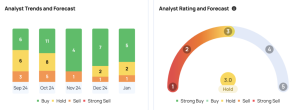
The Yahoo view: Movement Mortgage promotes itself as an “impact lender,” allocating 40% to 50% of its profit to improving the communities where it lends. While they offer a wide range of purchase and refinance products, they’re big on message but short on information buyers need — like rates, fees, and more.
Founded in 2007 and now offering mortgage loans in all 50 U.S. states, Movement Mortgage has a lot going for it. The company earns the second-highest customer satisfaction rating from J.D. Power — a definite plus since mortgage loans can come with their fair share of hassle. This mortgage company might also be a first-time buyer’s paradise. Offering a solid selection of low-down-payment products with flexible qualification criteria like VA loans, FHA loans, and Fannie Mae HomeReady®, Movement may be able to help you get into a home for less than you would think.
But we’ll put this thought out front: We always have a bit of a problem with lenders who don’t publish sample rates on their websites. Movement Mortgage falls into this category. With such a high customer satisfaction score, however, it seems customers don’t mind as much as we do.
Dig deeper: First-time home buyer in 2025 — What you need to know
Key benefits
-
Movement Mortgage offers multiple purchases and refinance products designed for lower-income borrowers, including FHA and USDA loans.
-
Purchase loans like the Fannie Mae HomeReady® option can give those in high minority census tracts and designated disaster areas an attractive, low down payment path to homeownership.
-
Its Movement Boost program can help qualified FHA buyers cover up to the full amount of the required 3.5% down payment.
-
The company invests 40% to 50% of its annual profits into communities through schools and educational initiatives.
-
Movement can originate mortgages in all 50 states.
Need to know
-
Movement doesn’t publish sample rates online. Only a loan officer or its online application process can get you sample rates.
-
Movement Mortgage settled a claim in 2023, agreeing to pay the U.S. a hefty $23.75 million to resolve allegations that it violated the False Claims Act related to several government-backed loan products.
Visit Movement Mortgage’s website to get started.
Movement Mortgage offers:
-
Conventional loans
-
FHA loans
-
VA loans
-
USDA loans
-
Purchase loans
-
Refinance loans
-
Cash-out refinance loans
-
Fixed-rate loans
-
Adjustable-rate loans
-
Jumbo loans
-
Construction loans
-
Renovation loans
-
Manufactured home loans
-
HELOCs
Movement Mortgage does not offer:
Dig deeper: What is a manufactured home, and how do you finance it?
If you’re a first-time homebuyer or haven’t taken out a Federal Housing Administration (FHA) loan in at least three years, Movement Mortgage can help. Movement offers both purchase and refinance FHA mortgage products; purchase loans require a mere 3.5% down payment, and those who currently have an FHA mortgage can use an FHA Streamline Refinance to lower their rate.
If that 3.5% down payment still seems out of reach, Movement could help you with that too. Their Movement Boost program gives qualified buyers down payment assistance that may cover the entire 3.5% figure. You’ll need a 600 FICO score to qualify for Boost (640 if buying a manufactured home), but the program doesn’t have income limits (yay). Unfortunately, borrowers in New York don’t qualify, and you’ll need to use the funds toward your primary residence.
The website lacks information about Movement’s minimum credit score for FHA loans, but you can always speak with a loan officer in your area for more information.
Learn more: Best FHA lenders
If you have a VA Certificate of Eligibility (COE)) or qualify to receive one, you may be eligible for a VA loan through Movement Mortgage. Offering both 15-year and 30-year fixed-rate VA loans, Movement sets its minimum borrower FICO score at a very liberal 580 for loans up to $1 million. They’ll lend up to $2 million, but loans that large require a FICO score of 680.
If you’re currently in a VA mortgage and want to refinance, Movement also offers VA mortgage refinancing to lower your interest rate. You can do either a rate-and-term refinance to lower your interest rate or use the VA’s cash-out refinance option to tap your equity. Some borrowers may qualify to cash out 100% of their home equity. Be sure to ask your loan officer for details.
Read more: Best VA loan lenders
If you’re looking for a home equity loan, you’ll have to keep looking. Movement doesn’t include them in its lending lineup. Need a home equity line of credit (HELOC)? Movement Mortgage has you covered.
HELOC applications are 100% online and have generous credit line limits — up to $400,000, which naturally depends on your home equity. Your credit line is also renewable, meaning you can redraw up to 100% of your credit line once you repay your initial draw in full.
While they don’t publish rates and fees on their website, we can tell you that rates are fixed. The company also boasts approval times as fast as five minutes and funding in as few as five days. Naturally, your experience may differ since approvals and funding depend on your unique financial circumstances.
Dig deeper: How to get a HELOC in 6 simple steps
Ah, yes. Interest rates. The upshot? Your guess is as good as ours.
Movement Mortgage doesn’t publish sample interest rates on their websites. That means we can’t tell you whether their mortgage rates are competitive with other lenders. We also can’t find any information on loan origination or lender fees, which makes comparison shopping tough.
To get sample rates, you’ll need to connect with a loan officer or start the online application process. And yes, the online option requires you to provide a decent amount of personal information (assets, veteran status, income, etc.). Apologies to those who prefer a less intense path to rates and fees.
Read more: 5 strategies to get the lowest mortgage rates
Yahoo Finance uses 2023 Home Mortgage Disclosure Act data made up of 10 million home loan applications to score mortgage lenders on issued mortgage rates and total loan costs. We score each lender on a scale of 1 (lowest) to 5 (highest).
With mortgage rates, a lender with a lower score charged a higher-than-median mortgage interest rate for loans issued in 2023. A higher score indicates that a lender granted borrowers lower-than-median home loan interest rates in 2023.
With total home loan costs, a lower score would indicate that a lender charged higher-than-median total home loan costs in 2023. A high rating would mean a mortgage lender offered lower-than-median all-in home loan costs in 2023.
What this means: Movement Mortgage offered a higher-than-median mortgage rate of 6.75% and a higher-than-median total loan cost of $7,468.60 to borrowers in 2023.
You have two options for applying for a mortgage with Movement: Go through a local loan officer or use their online application.
If you go through a local loan officer, you can click the “Find a Loan Officer” button that pops up on nearly every page of their website. From there, you’ll land on a search page. Just type in your address, and you’ll get a list of loan officers in your area, including the addresses of local Movement Mortgage branch offices.
To apply online, you can click the “Apply Now” button. That will take you to a secure application website where you can input various financial and demographic criteria. Then, Movement will show you sample rates and mortgage products based on your finances and interest.
Unfortunately, there’s no way to solely get preapproved for a mortgage with Movement online. You can start a mortgage application by clicking the “Apply Now” button on various pages of the site. However, there’s nothing that explicitly points to a preapproval. I mean, it’s possible we missed it. This website is, on a good day, a tough cookie to navigate.
Our best tip? Connect with a human at Movement to see what their mortgage preapproval process entails.
Dig deeper: How does mortgage preapproval work?
One area where we find Movement Mortgage lacking is its home-buyer tools. While it offers some helpful calculators — mortgage, affordability, and refinance — it doesn’t have a resource library at all. What’s more, to get to their calculators is a bit of a hassle. You’ll need to go to the main navigation, hover over “Home Loans,” and carefully float your mouse to the calculator you want to reach in the flyout menu. There’s no easy way to find these tools other than that path.
And speaking of web design, Movement’s website is more reminiscent of a hip ad agency than a mortgage lender. The user experience could use an overhaul, especially with its overbearing flyout menus. One false hover and the flyouts take over the page, and you’re stuck trying to get rid of them when all you want is to read the page.
Learn more: How much house can I afford? Use Yahoo Finance’s home affordability calculator.
-
Movement earns high marks (4 out of 5) for affordability, thanks to its vast selection of loan options for purchase, refinance, and HELOCs.
-
This company comes in at the middle of the road (3 out of 5) for both loan costs and rate transparency.
-
With a lack of handy home-buyer resources, Movement earns low marks (2 out of 5) for online features.
-
Since you have to either complete the online application or contact a loan officer for rates, Movement also earns low marks (2 out of 5) for rate transparency.
Read more: Mortgage lender fees — How they differ from other closing costs
Movement Mortgage and Fairway Independent Mortgage each offer down payment assistance for qualified first-time homebuyers. Movement does this through Movement Boost, whereas Fairway uses its Fairway Community Access™ program. Neither program has income limits, but their assistance limits vary. Movement offers assistance up to the full 3.5% down payment for FHA loans, Fairway caps its assistance at $7,000; Movement offers up to the full 3.5% down payment for FHA loans, but this program is limited to FHA loans.
In the customer service realm, Fairway comes in at the No. 7 spot on J.D. Power’s 2024 Mortgage Originator Satisfaction Survey, compared to Movement Mortgage’s No. 2 ranking.
Rocket Mortgage also offers down payment assistance to first-time home buyers. Its One+ program allows borrowers to get conventional loans with only 1% down.
Movement Mortgage will cover your total 3.5% down payment on an FHA loan, so the choice may come down to whether an FHA loan versus a conventional loan is better for you. Each comes with its own requirements, interest rates, and fees.
Movement offers more loan options than Rocket Mortgage, including USDA loans and HELOCs. But unlike Movement, Rocket Mortgage has home equity loans.
Movement Mortgage is an FHA lender with extra perks available to qualified borrowers, like down payment assistance through Movement Boost. Movement also has hundreds of branches nationwide, making it easy to have a personal touch during your application process.
Pennymac is the nation’s largest FHA lender, with some buyer perks that Movement just can’t touch. Pennymac offers a 1% discount on your FHA mortgage rate for one full year. And if you use an affiliated real estate agent, you could earn $350 to $9,500 cash back at closing.
Movement Mortgage is a reputable company, established in 2008. It currently offers loans in all 50 states and earned top customer satisfaction marks from J.D. Power in its 2024 survey of mortgage lenders.
Movement Mortgage identifies as an impact lender that invests 40% to 50% of its annual profits in community-based programs.
Movement Mortgage was founded in 2008 and currently has more than 4,500 employees across 775 locations in the U.S.
Methodology:
Yahoo Finance reviews and scores mortgage lenders with quintile scoring in five primary categories: 1) Interest rates. Using 2023 Home Mortgage Disclosure Act data comprised of 10 million home loan applications, we score mortgage lenders on issued mortgage rates below or above the annual median of reporting lenders. 2) Affordability. A measure of loan product availability and the willingness of a lender to offer government-backed loans, low down payments, down payment assistance, and consideration of nontraditional credit. 3) Loan costs. HMDA data is again analyzed, and lenders are rated based on total loan costs compared to the annual median. 4) Rate transparency. The ability of a website user to obtain a mortgage interest rate estimate. We score lenders based on whether rates are enhanced with discount points or high credit score requirements, disclaimers revealing rate assumptions, sample advertised rates, and whether adjustable or no discount point rate estimates are available. 5) Online features. An analysis of the educational material, calculators, and additional resources available to users.
Review of Nationwide Multistate Licensing System (NMLS) data on regulatory actions can trigger a penalty to the score of any lender with a consumer mortgage-related administrative or enforcement action within the past five years.
Advertisers or sponsorships do not influence ratings.
Editorial disclosure for mortgages:
The information in this article has not been reviewed or approved by any advertiser. The details on financial products, including interest rates and fees, are accurate as of the publish date. All products or services are presented without warranty. Check the lender’s website for the most current information. This site doesn’t include all currently available offers.
This article was edited by Laura Grace Tarpley.


